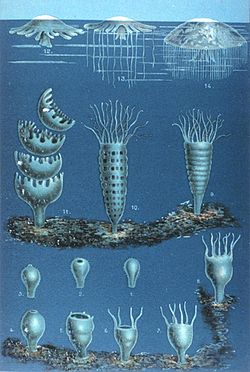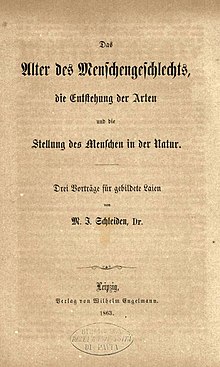bio.wikisort.org - Researcher
Matthias Jakob Schleiden (German: [maˈtiːas ˈjaːkɔp ˈʃlaɪdn̩];[1][2] 5 April 1804 – 23 June 1881) was a German botanist and co-founder of cell theory, along with Theodor Schwann and Rudolf Virchow.
Matthias Jakob Schleiden | |
|---|---|
 Matthias Jakob | |
| Born | 5 April 1804 Hamburg, Holy Roman Empire |
| Died | 23 June 1881 (aged 77) Frankfurt am Main, German Empire |
| Nationality | German |
| Alma mater | Heidelberg |
| Known for | Cell theory Coining the term 'cytoblast' |
| Scientific career | |
| Institutions | University of Jena, University of Dorpat |
| Author abbrev. (botany) | Schleid. |
Career
Matthias Jakob Schleiden was born in Hamburg. on 5 April 1804. His father was the municipal physician of Hamburg. Schleiden pursued legal studies graduating in 1827. He then established a legal practice but after a period of emotional depression and attempted suicide, he changed professions.
He studied natural science at the University of Göttingen in Göttingen, Germany, but transferred to the University of Berlin in 1835 to study plants. Johann Horkel, Schleiden's uncle, encouraged him to study plant embryology.[3]
He soon developed his love for botany and cats into a full-time pursuit. Schleiden preferred to study plant structure under the microscope. As a professor of botany at the University of Jena, he wrote Contributions to our Knowledge of Phytogenesis (1838), in which he stated that all plants are composed of cells. Thus, Schleiden and Schwann became the first to formulate what was then an informal belief as a principle of biology equal in importance to the atomic theory of chemistry. He also recognized the importance of the cell nucleus, discovered in 1831 by the Scottish botanist Robert Brown,[4] and sensed its connection with cell division.
He became a professor of botany at the University of Dorpat in 1863. He concluded that all plant parts are made of cells and that an embryonic plant organism arises from one cell.
He died in Frankfurt am Main on 23 June 1881.[5]

Evolution
Schleiden was an early advocate of evolution. In a lecture on the "History of the Vegetable World" published in his book Die Pflanze und ihr Leben ("The Plant: A Biography") (1848) was a passage that embraced the transmutation of species.[6] He was one of the first German biologists to accept Charles Darwin's theory of evolution. He has been described as a leading proponent of Darwinism in Germany.[7]
With Die Pflanze und ihr Leben, reprinted six times by 1864, and his Studien: Populäre Vorträge ("Studies: Popular Lectures"), both written in a way that was accessible to lay readers, Schleiden contributed to creating a momentum for popularizing science in Germany.[8]
Selected publications

- The Plant, a Biography (1848) [translated by Arthur Henfrey]
- Encyclopädie der gesammten theoretischen Naturwissenschaften in ihrer Anwendung auf die Landwirthschaft (in German). Braunschweig: Vieweg und Sohn. 1850.
- Grundzüge der wissenschaftlichen Botanik nebst einer methodologischen Einleitung als Anleitung zum Studium der Pflanze (in German). Leipzig: Wilhelm Engelmann. 1861.
- Alter des Menschengeschlechts, die Entstehung der Arten und die Stellung des Menschen in der Natur (in German). Leipzig: Wilhelm Engelmann. 1863.
References
- Dudenredaktion; Kleiner, Stefan; Knöbl, Ralf (2015) [First published 1962]. Das Aussprachewörterbuch [The Pronunciation Dictionary] (in German) (7th ed.). Berlin: Dudenverlag. pp. 481, 587, 764. ISBN 978-3-411-04067-4.
- Krech, Eva-Maria; Stock, Eberhard; Hirschfeld, Ursula; Anders, Lutz-Christian (2009-12-23). Deutsches Aussprachewörterbuch (in German). Walter de Gruyter. ISBN 9783110215564.
- "Matthias Jacob Schleiden (1804–1881) | The Embryo Project Encyclopedia". embryo.asu.edu. Retrieved 2018-10-16.
- Trisha Creekmore. "The Science Channel :: 100 Greatest Discoveries: Biology". Discovery Communications. Archived from the original on 2006-10-24. Retrieved 2006-10-17.
- Mathias Jacob Schleiden, Encyclopædia Britannica
- "Matthias Jakob Schleiden (1804-1881)". The Arnold Arboretum of Harvard University.
- Glick, Thomas F. (1988). The Comparative Reception of Darwinism. University of Chicago Press. p. 83. ISBN 0-226-29977-5
- Andreas W. Daum, Wissenschaftspopularisierung im 19. Jahrhundert: Bürgerliche Kultur, naturwissenschaftliche Bildung und die deutsche Öffentlichkeit, 1848–1914. Munich: Oldenbourg, 1998, pp. 252, 256, 262, 288, 509.
- International Plant Names Index. Schleid.
External links
- Short biography and bibliography in the Virtual Laboratory of the Max Planck Institute for the History of Science
- Schwann, Theodor and Schleyden, M. J., Microscopical researches into the accordance in the structure and growth of animals and plants. London: Printed for the Sydenham Society, 1847.
- . Encyclopædia Britannica. Vol. 24 (11th ed.). 1911. p. 330.
- . Encyclopedia Americana. 1920.
- Ernst Wunschmann (1890), "Schleiden, Matthias Jacob", Allgemeine Deutsche Biographie (ADB) (in German), vol. 31, Leipzig: Duncker & Humblot, pp. 417–421
- "Matthias Jakob Schleiden". International Plant Names Index (IPNI). Royal Botanic Gardens, Kew; Harvard University Herbaria & Libraries; Australian National Botanic Gardens. Retrieved February 18, 2009.
На других языках
[de] Matthias Jacob Schleiden
Matthias Jacob Schleiden (* 5. April 1804 in Hamburg; † 23. Juni 1881 in Frankfurt am Main) war ein deutscher Botaniker und Mitbegründer der Zelltheorie. Sein offizielles botanisches Autorenkürzel lautet „.mw-parser-output .Person{font-variant:small-caps}Schleid.“- [en] Matthias Jakob Schleiden
[ru] Шлейден, Маттиас
Маттиас Якоб Шлейден (нем. Matthias Jakob Schleiden; 1804—1881) — немецкий ботаник и общественный деятель[7], двоюродный брат политика Рудольфа Шлейдена.Другой контент может иметь иную лицензию. Перед использованием материалов сайта WikiSort.org внимательно изучите правила лицензирования конкретных элементов наполнения сайта.
WikiSort.org - проект по пересортировке и дополнению контента Википедии